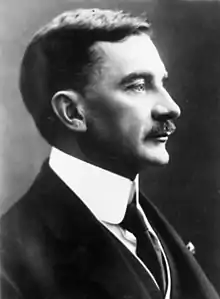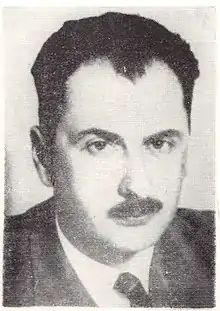1932 Romanian general election
General elections were held in Romania in July 1932.[1] The Chamber of Deputies was elected on 17 July, whilst the Senate was elected in three stages on 20, 24 and 26 July.[1] The result was a victory for the National Peasants' Party-German Party alliance, which won 274 of the 387 seats in the Chamber of Deputies and 104 of the 113 seats in the Senate elected through universal male vote.[2] Of the 274 Chamber seats, 265 were taken by the National Peasant's Party and nine by the German Party.[2]
| |||||||||||||||||||||||||||||||||
All 387 seats in the Chamber of Deputies All 113 seats in the Senate | |||||||||||||||||||||||||||||||||
|---|---|---|---|---|---|---|---|---|---|---|---|---|---|---|---|---|---|---|---|---|---|---|---|---|---|---|---|---|---|---|---|---|---|
| |||||||||||||||||||||||||||||||||
| |||||||||||||||||||||||||||||||||
Results
| Party | Chamber | Senate | ||||||
|---|---|---|---|---|---|---|---|---|
| Votes | % | Seats | +/– | Votes | % | Seats | +/– | |
| National Peasants' Party–German Party | 1,203,700 | 41.5 | 274 | +244 | 104 | +103 | ||
| National Liberal Party | 407,023 | 14.0 | 28 | – | 1 | – | ||
| National Liberal Party-Brătianu | 195,048 | 6.7 | 14 | +2 | 0 | 0 | ||
| Peasants' Party–Lupu | 170,860 | 5.9 | 12 | +5 | 1 | +1 | ||
| National-Christian Defense League | 159,071 | 5.5 | 11 | +3 | 2 | +2 | ||
| Magyar Party | 141,894 | 4.9 | 14 | +4 | 3 | –1 | ||
| National Agrarian Party | 108,857 | 3.8 | 8 | New | 0 | New | ||
| Social Democratic Party | 101,068 | 3.5 | 7 | +1 | 0 | 0 | ||
| Codreanu Group | 70,674 | 2.4 | 5 | New | 0 | New | ||
| National Union[a] | 68,116 | 2.3 | 5 | – | 0 | – | ||
| Jewish Party | 67,582 | 2.3 | 5 | +1 | 0 | 0 | ||
| People's Party | 64,525 | 2.2 | 4 | –6 | 0 | 0 | ||
| Traders Council | 45,851 | 1.6 | 0 | New | 0 | New | ||
| Democratic Peasants' Party–Stere | 41,454 | 1.4 | 0 | –5 | 0 | 0 | ||
| Conservative Party | 18,643 | 0.6 | 0 | New | 0 | New | ||
| Agrarian League | 14,831 | 0.5 | 0 | New | 0 | New | ||
| Peasant Workers' Bloc | 9,441 | 0.3 | 0 | –5 | 0 | 0 | ||
| Civic Union | 1,503 | 0.1 | 0 | New | 0 | New | ||
| Other parties | 9,178 | 0.3 | 0 | – | 0 | – | ||
| Democratic Peasant Party | – | – | – | – | 2 | New | ||
| Invalid/blank votes | 87,810 | – | – | – | – | – | – | |
| Total | 2,987,129 | 100 | 387 | 0 | 113 | 0 | ||
| Registered voters/turnout | 4,220,731 | 70.8 | – | – | – | – | ||
| Source: Sternberger et al.,[3] Nohlen & Stöver | ||||||||
a Of the five seats won by the National Union (an alliance of the National Party–Iorga, the Democratic Nationalist Party and the Agrarian Union Party), the National Party–Iorga took three and the Agrarian Union Party two.[4]
References
- Dieter Nohlen & Philip Stöver (2010) Elections in Europe: A data handbook, p1591 ISBN 978-3-8329-5609-7
- Nohlen & Stöver, p1610-1611
- Dolf Sternberger, Bernhard Vogel, Dieter Nohlen & Klaus Landfried (1978) Die Wahl der Parlamente: Band I: Europa, Zweiter Halbband, pp1062–1064
- Nohlen & Stöver, p1610
This article is issued from Wikipedia. The text is licensed under Creative Commons - Attribution - Sharealike. Additional terms may apply for the media files.


